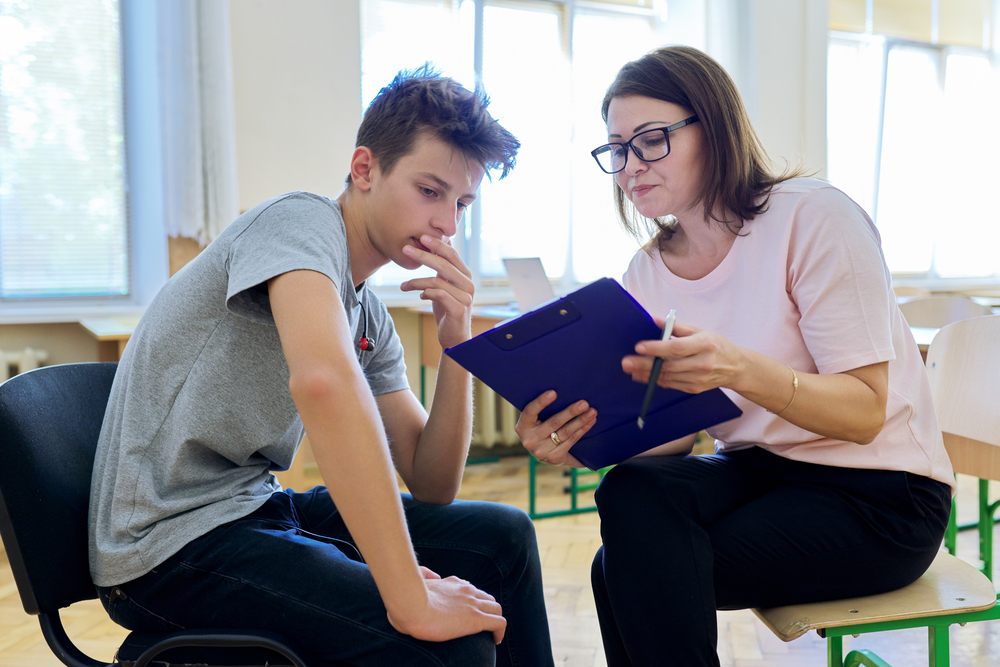Adolescence is a time in one’s life that is filled with difficult lessons, emotional growth, physical and emotional maturation, surging hormones, and a newfound need for autonomy.
Children are faced with countless trials and tribulations, many of which they are ill equipped to effectively navigate without support.
A teen’s brain is not yet fully developed, and though some young people may appear as adults externally, internally they are operating with an underdeveloped pre-frontal cortex. This is the area of the brain that reigns rational thought, impulse control, executive planning, and more. Instead, adolescents using the amygdala (area of the brain that governs one’s emotions, impulsivity, emotional behavior, and motivation) instinctively process external stimuli. It is often difficult to distinguish between typical teenage behavior and child behaviors that may be indicative of larger issues and could benefit from professional guidance. Research has found that one teen out of every five teenagers has a diagnosable mental health disorder, in the United States. There are several types of psychotherapy that involve different approaches, techniques, and interventions. It is difficult to provide a universally accurate answer as to which type of therapy is most effective for teenagers because every teen is unique with distinct and nuanced needs. Psychotherapeutic modalities that are commonly used with teenagers may include one or more of the following:
- Cognitive behavioral therapy (CBT): focuses on challenging and changing unhelpful cognitive distortions and behaviors, improving emotional regulation, and developing personal coping strategies to problem solve effectively.
- Dialectical behavior therapy (DBT): utilizes four main strategies (e.g., core mindfulness, distress tolerance, interpersonal effectiveness, emotion regulation) for teaching young people skills that help with effectively changing their behaviors.
- Expressive arts therapy (e.g., play therapy, art therapy, music therapy, drama therapy, sand therapy, etc.): provides an alternative medium to express, process, and integrate one’s thoughts and feelings surrounding the treatment process.
- Eye movement desensitization and reprocessing therapy (EMDR): utilizes guided eye movement techniques to help process one’s memories, thoughts, and emotional associations.
- Group therapy: participating in group therapy sessions can help an adolescent learn from peers that are navigating thoughts and emotions facing similar challenges.
- Interpersonal therapy (IPT): focuses on how a young person’s communications and interactions with other people affect his or her own mental health.
- Motivational interviewing (MI): is a counseling method that helps people resolve ambivalent feelings and insecurities to find the internal motivation they need to change their behavior.
To provide a teenager with the highest potential for successful, long-term results, a customized and nuanced treatment plan that considers all treatment options and incorporates the therapeutic modalities that are expressly geared to each teenager’s personal needs is required.
Further Information and Support
For most of us, life can be very stressful, leading us to feel emotionally charged, which can cause anxiety, panic attacks, depression, and getting stuck in a cycle of being burdened with negative thoughts. Navigating through the challenges and emotional turmoil of life can be overwhelming, but you do not have to go through it alone. Engage Treatment is a Joint Commission Accredited professional psychological practice. We specialize in treating children, teens, and young adults struggling with depression and anxiety through community-focused treatment plans that incorporate a carefully selected combination of therapeutic interventions. Our compassionate, multidisciplinary practitioners are devoted to providing the highest quality of care that helps ignite positive change and enables clients to reach optimal health and well-being. Please do not hesitate to reach out for guidance. We are happy to answer questions and provide you with any additional information. Feel free to call us at 805-497-0605 or email us at [email protected]. You are also welcomed to get in touch by filling out our contact form. We look forward to connecting and having the opportunity to discuss how we might best be able to support you.
Contact Us
Westlake Campus:
IOP Program
2625 Townsgate Road, Suite 210
Westlake Village, California 91361
Agoura Campus:
Private Therapy & Parenting Program
30300 Agoura Road, Suite 250
Agoura Hills, CA 91301
805-497-0605
805-371-4862











© 2023 Engage Treatment Program, Inc. All Rights Reserved.
LGBTQ Friendly
About
• About Engage
• Our Team
• Career Opportunities
• Individual / Family Therapy






